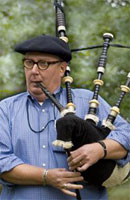|
 |
| Teachers.Net Gazette Vol.6 No.7 | July 2009 |
Subscribe for free home delivery |
|
The School of No Knocks? Are we going too far with efforts to eliminate conflict between kids? Should we be sending kids to the school of No Knocks? Does it make kids expect that the playing field will always be leveled for them? Does it prepare them for the mean people who will not alter their behavior to spare their feelings. Does it give kids coping skills, or false expectations? | ||
| by Todd R. Nelson Continued from page 1 July 1, 2008 |
||
 Should we be sending kids to this school of No Knocks? Does it make kids expect that the playing field will always be leveled for them? Does it prepare them for the mean people who will not alter their behavior to spare their feelings. Does it give kids coping skills, or false expectations? Rather than play without competition, a new kind of competition set in: My kid will never feel the stress and hurt that I did on the playground. In other words, little Timmy’s childhood is being placed in competition with his Dad’s. Nor is it good to have the inverse: “When I was your age, we had fights behind the gym every day. Toughen up. Be more like your old man.” Dad –2.0. The point is that many parents throw their adult egos and professional skills into the playground. Many a school administrator can attest to mediating between grown ups battling within their parent cohort over that “garden-variety nastiness” little Timmy experienced at morning recess. I feel their pain. My wife and I have also experienced seventh grade from the perspective of a daughter—twice. It ain’t pretty. When my kid is the lonely one in the lunchroom, my heart breaks. But when that same daughter, now a happy high school senior, came home the other night and vented about a friendship dilemma, I felt glad that I had shown restraint during her seventh grade turmoil. Even though I was ready with problem-solving ideas, she cut me off. “Dad! I just want you to listen,” she said. “I’m not looking for a solution.” So how do we resolve the tension between our desire to make childhood nicer, and the desire to allow our kids some negative experiences to promote the long term, positive outcome of self-efficacy? My daughter knew: Protecting children from childhood is not the same as supporting them as they navigate its rigors.
Todd R. Nelson is principal of the Adams School in Castine, Maine. He worked in independent schools for 22 years. | ||
|
 You can make up all the checklists you want. You can take advice from your mentors. At the end of the day, what lies behind one's teaching style is what matters. A "Great Teacher" is the right teacher at the right time, at the right place.
You can make up all the checklists you want. You can take advice from your mentors. At the end of the day, what lies behind one's teaching style is what matters. A "Great Teacher" is the right teacher at the right time, at the right place.

 Todd R. Nelson has been a public and private school English teacher and administrator for 29 years, in schools in Cambridge, San Francisco, Chicago and Maine. He is principal at the Adams School in Castine, Maine, a 54 student K-8 school on the town common in a little town on the coast, where he gets to play four-square at recess, play his bagpipes, and write musicals for the all-school play.
Todd R. Nelson has been a public and private school English teacher and administrator for 29 years, in schools in Cambridge, San Francisco, Chicago and Maine. He is principal at the Adams School in Castine, Maine, a 54 student K-8 school on the town common in a little town on the coast, where he gets to play four-square at recess, play his bagpipes, and write musicals for the all-school play.